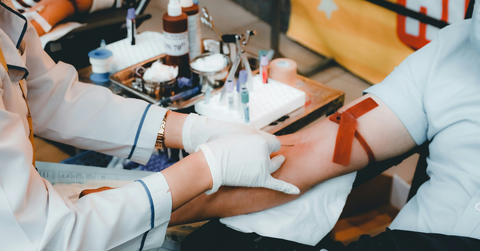Study Reveals Donating Plasma May Have Health Benefits to Donors as Well as Recipients
The process of donating plasma can have a lot of unique impacts on your body and organs.
Published Oct. 29 2025, 2:50 p.m. ET

Donating blood has long been touted as a great way to give back to your community, especially for those who have rare blood types or in times of crisis. And, while donating blood is great for those who need blood transfusions or extra blood supplies, it may have a benefit for donors as well.
That's because a study published in JAMA Network Open says that donating plasma may help reduce the level of unwanted toxins in the body, potentially improving donor health as well.
When you remove the plasma from your body (along with those toxins), you trigger a systematic response, which can involve several different organs and internal systems that work to restore balance to your body. The good news is that most of the time your body will recalibrate within 24 to 48 hours of the donation.
So, what happens to your body when you donate plasma? Keep reading to find out more, including what toxins may be removed as part of the process.

What happens to your body when you donate plasma?
According to the Cleveland Clinic, plasma is the component of your blood that makes it liquid, and it accounts for a little more than half of the total volume of your body's blood. There are other things that combine to make up your blood, including red and white blood cells and platelets, which are mixed in with your blood.
When you donate plasma, a phlebotomist will draw your blood using a needle that is inserted into your arm and attached to a machine called a plasmapheresis.
From there, the ABO Plasma blog says that the machine uses a centrifuge to isolate the plasma, and then it sends the remaining components back into the donor's body. However, the blog says that as soon as the plasma leaves your body and enters the plasmapheresis machine, your body immediately begins working to replace it so that it can restore balance.
That can involve everything from regenerating proteins to fluid regulation, which involves activating organs like the liver and heart.

According to an October 2025 JAMA study, your plasma donation may take more than just blood. In fact, it may also unintentionally remove the per- and polyfluoroalkyl substances (PFAS) that are also known as forever chemicals. These chemicals are typically used in making non-stick or waterproof items, and they can be found in everything from the air we breathe to the water we drink.
These PFAS have been known to cause unwanted health outcomes ranging from liver disease to cancer.
It looks like the clinical trial showed that plasma donors were able to reduce the levels of PFAS in their blood by 30 percent, raising interesting questions about what happens when you donate plasma.

What are the side effects of donating plasma?
Like most things in life, donating plasma isn't without its side effects. According to Healthline, these side effects can include:
- Dehydration
- Dizziness or fainting
- Fatigue
- Bruising
- Discomfort
- Infection
In rare cases, some people may experience a citrate reaction, which can include numbness, a vibrating sensation, chills, shivering, shortness of breath, and more. It can even be fatal in the most extreme cases.
That being said, donating plasma is considered relatively safe for most people.